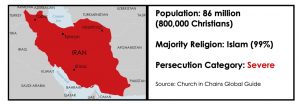 The Islamic Republic of Iran comprises a large central desert surrounded by mountains and is rich in oil and natural gas. It is the home of Shia Islam, which is followed by at least 90% of the population, and is a theocracy in which Supreme Leader Ayatollah Ali Khamenei, who has ruled since 1989, is more powerful than the elected president.
The Islamic Republic of Iran comprises a large central desert surrounded by mountains and is rich in oil and natural gas. It is the home of Shia Islam, which is followed by at least 90% of the population, and is a theocracy in which Supreme Leader Ayatollah Ali Khamenei, who has ruled since 1989, is more powerful than the elected president.
Iran had cordial relations with the West under the Pahlavi monarchy but religious, political and popular dissatisfaction with the Shah’s programme of modernisation and Westernisation and his repression of dissent led to him being deposed in the Islamic revolution of 1979, and Ayatollah Ruholla Khomeini declared Iran the world’s first Islamic republic.
Since then Iran has swung between more rigid and relatively liberal interpretations of Islamic rule. In June 2021 the presidential election was won by hardline Chief Justice Ebrahim Raisi, who was tipped to succeed Ayatollah Khamenei as Supreme Leader but died in a helicopter crash in May 2024. In July 2024 the reformist Masoud Pezeshkian was elected to replace him.
There is widespread social breakdown in Iran and disillusionment with the regime, and the government has been widely condemned for its many human rights abuses. Population growth followed by rapid urbanisation has led to millions of unemployed youth in cities, where there are many drug addicts and street children, and rates of depression are high, especially in Tehran.
Christians in Iran
Religious freedom is guaranteed in the constitution and the estimated 50,000–80,000 Iranian Christians who worship in the historic churches (ethnic Armenian and Assyrian) are permitted to meet, although they operate under tight restrictions and must conduct their services in the Armenian and Assyrian languages, not Farsi (Persian, the official language of Iran, which is spoken by the general populace) and they are not allowed to accept converts.
Just four Persian-speaking churches are still permitted to operate in Iran, all very small Anglican congregations that are only allowed to admit Iranians who can prove they were Christians before the Islamic revolution of 1979. These churches are kept under tight surveillance by the authorities and new members are strictly forbidden. During the Covid-19 pandemic these churches were closed, but unlike other places of worship they have not been permitted to reopen.
In 1979 there were only about 500 Iranian Christian converts from Islam, but there are now at least 500,000 and some researchers believe there may be over 700,000, although it is impossible to estimate accurately because they can only meet in secret house churches. The government views house churches as a major threat because they use Farsi and are composed almost entirely of converts from Islam. Security police are constantly trying to find and close them and leaders are often tortured in an attempt to track down all members.
Government intelligence agents often arrest Christians converts in raids on their homes or house church meetings and even at social gatherings. They are often charged with “threatening national security” and “actions against the regime” and have to pay large amounts to get bail, after which they may effectively be forced to leave the country by threats of long prison sentences.
Christians in prison suffer sleep deprivation, unsanitary conditions, illness, denial of medical treatment and sometimes prolonged beating. They also face many hours of interrogation, including torture, threats of execution and harm to family members, and pressure to recant their faith.
Before Christians are released (often on large bail payments) they may be forced to sign that they renounce their faith and will not participate in Christian activities. They are closely monitored after release and face further arrest or prosecution if they continue to meet with other Christians. Bail demands for Iranian Christian converts can range from the equivalent of a few thousand euro to the deeds of a house.
The Iranian authorities also severely persecute the Baha’i community, which has around 350,000 members. They routinely suffer discrimination in education and employment, and many have been imprisoned.
Harsher sentencing since 2021 amendments
Amendments to Article 500 of Iran’s penal code which were introduced in 2021 allow harsher sentencing of Christians (prison sentences of between two and five years, deprivation of civil rights such as voting for up to 15 years and heavy fines) for “any deviant educational or propaganda that contradicts or interferes with the sacred Sharia”.
Amendments made at the same time to Article 499, which deals with membership or organisation of “anti-security groups”, make it a punishable offence to “insult divine religions or Islamic schools of thought… with the intent to cause violence or tensions in society or with the knowledge that such will follow”.
The two existing Articles were already used in prosecuting Christians but the new wording is open to interpretation and the amended Articles were immediately used against Christians.
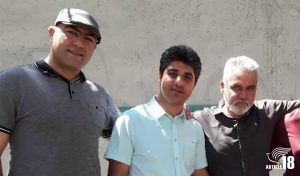 The first Christians to be charged and convicted under the newly-amended Article 500 (Milad Goudarzi, Amin Khaki and Alireza Nourmohammadi, pictured) were each sentenced to five years in prison in June 2021 and fined for “engaging in propaganda that educates in a deviant way contrary to the holy religion of Islam”. They were summoned to prison in November 2021, but were released in 2023 under a general amnesty for political prisoners.
The first Christians to be charged and convicted under the newly-amended Article 500 (Milad Goudarzi, Amin Khaki and Alireza Nourmohammadi, pictured) were each sentenced to five years in prison in June 2021 and fined for “engaging in propaganda that educates in a deviant way contrary to the holy religion of Islam”. They were summoned to prison in November 2021, but were released in 2023 under a general amnesty for political prisoners.
(Article 18, BBC, Compass Direct News, Christian Solidarity Worldwide, Elam, FCNN, Middle East Concern, Mohabat News, Open Doors, Operation World, Reuters, World Watch Monitor)
Church in Chains in Action
Church in Chains has spoken up on behalf of Christians in Iran for many years. In October 2018, Church in Chains wrote to the Iranian Embassy in Dublin appealing for better treatment for Christian prisoner Ebrahim Firouzi.
 On 19 March 2015, a Church in Chains delegation visited the Iranian Embassy in Dublin, where Joanna Tuffy TD presented a petition highlighting the persecution of Christians in Iran to the Ambassador, Mr Javad Kachouiean. The petition, signed by twenty members of the Oireachtas, appealed for the release of three Christian leaders (Saeed Abedini, Farshid Fathi and Behnam Irani) and Mohammed Ali Dadkhah, a human rights lawyer who represented Christians. The four men were released on different dates in 2015 and 2016.
On 19 March 2015, a Church in Chains delegation visited the Iranian Embassy in Dublin, where Joanna Tuffy TD presented a petition highlighting the persecution of Christians in Iran to the Ambassador, Mr Javad Kachouiean. The petition, signed by twenty members of the Oireachtas, appealed for the release of three Christian leaders (Saeed Abedini, Farshid Fathi and Behnam Irani) and Mohammed Ali Dadkhah, a human rights lawyer who represented Christians. The four men were released on different dates in 2015 and 2016.
Church in Chains campaigned extensively for Youcef Nadarkhani, a Christian sentenced to death in 2010. He was released in September 2012, but was returned to prison in July 2018 to begin serving a ten-year sentence.
In the early 1990s, the murder of a number of pastors led to Church in Chains holding a public memorial service outside the Iranian Embassy in Dublin.
IRAN: Naser Navard Gol-Tapeh suffers stroke in prison
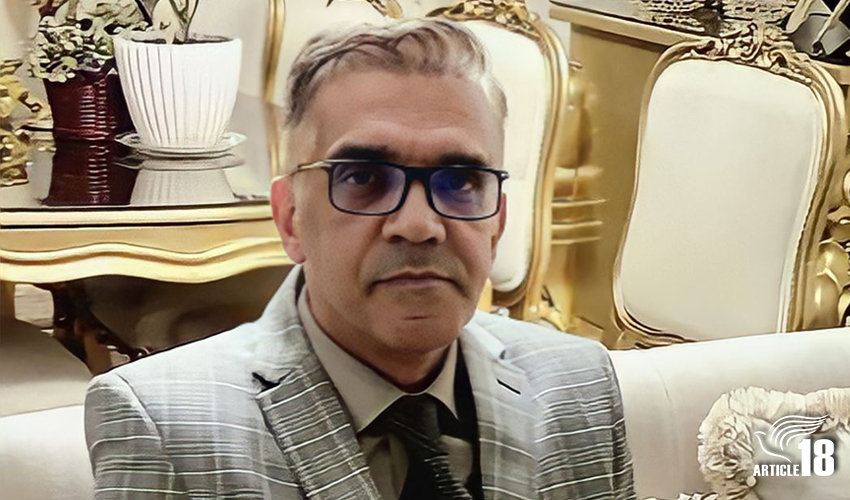
The 63-year-old Christian convert had been on hunger strike in Tehran’s Evin Prison for 35 days when he suffered a stroke.
IRAN: Three Christian converts given long prison sentences
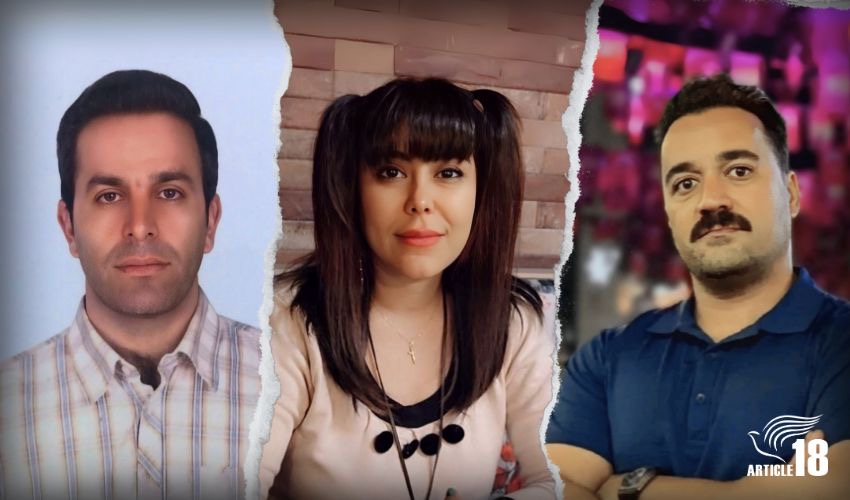
Abbas Soori, Narges Nasri, and Mehran Shamloui were sentenced to over 40 years in prison on charges related to their faith.
IRAN: Somayeh Rajabi released on large bail

Christian convert released after submitting bail equivalent to €36,000 approx
IRAN: Christian convert arrested and Bibles confiscated in raid

A Christian convert was arrested and Bibles and other items were confiscated in a raid by the Islamic Revolutionary Guard Corps
IRAN: Two released Christian prisoners rearrested
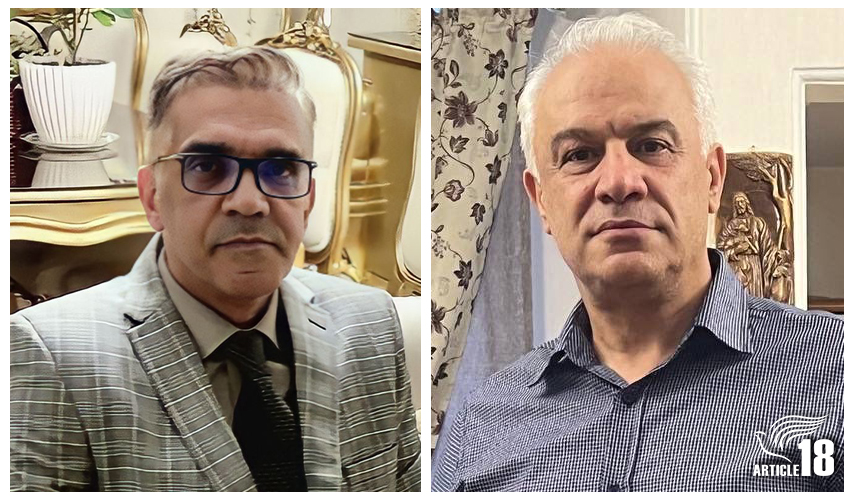
Naser Gol Tapeh and Joseph Shabazian were re-arrested and taken back to Evin Prison, where they had both been previously imprisoned.
